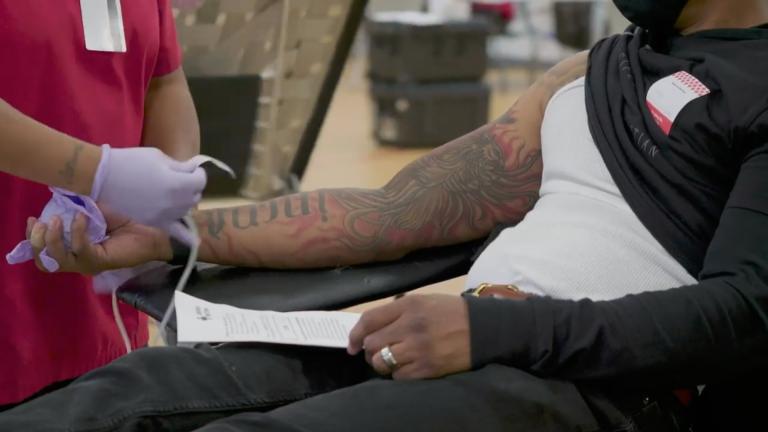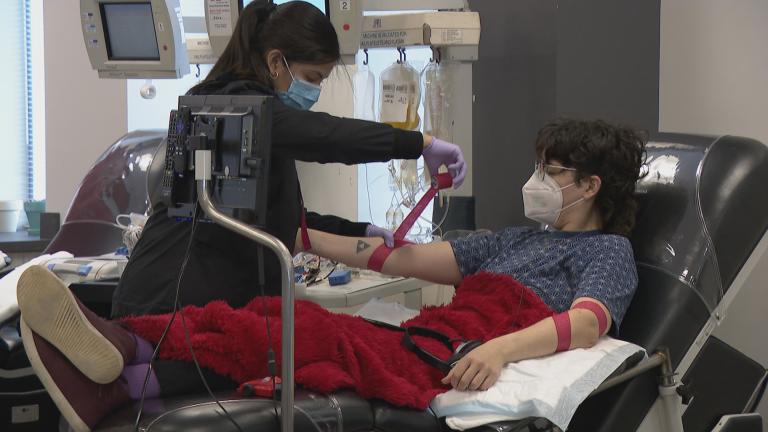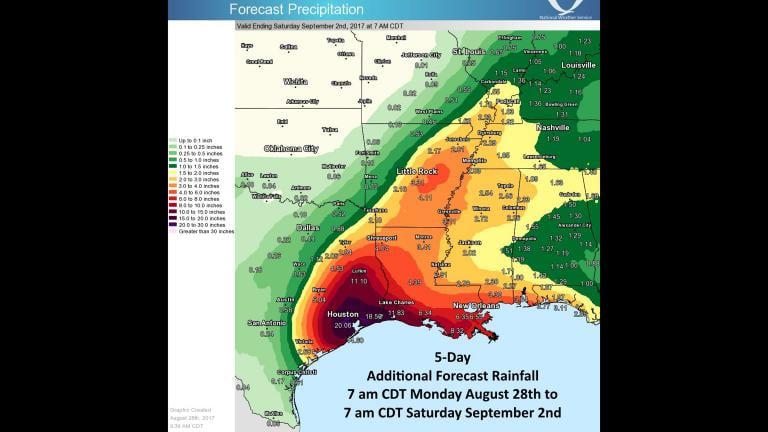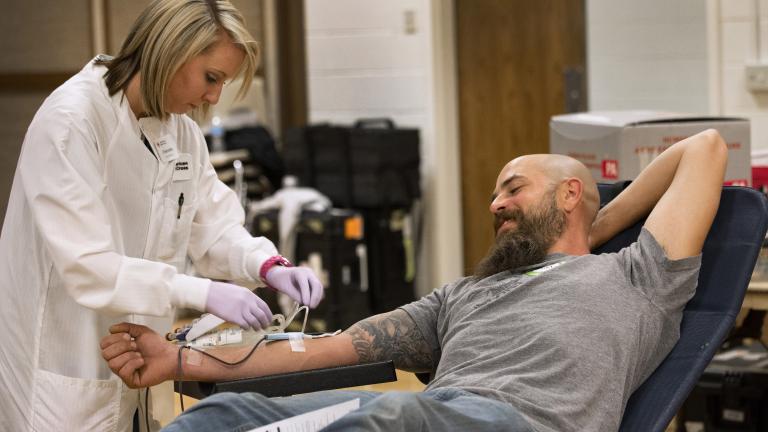The U.S. is experiencing a “national blood crisis” during what the American Red Cross says is the worst blood shortage in over a decade.
In a joint statement with America’s Blood Centers and the Association for the Advancement of Blood and Biotherapies, the Red Cross warns that the nation’s blood supply is at one of its lowest levels in recent years.
“In recent weeks, blood centers across the country have reported less than a one-day’s supply of blood of certain critical blood types — a dangerously low level,” the statement reads. “If the nation’s blood supply does not stabilize soon, life-saving blood may not be available for some patients when it is needed.”
A combination of winter weather challenges, a surge in COVID-19 cases from the omicron variant and a decline in donors and volunteers is causing blood drives to be canceled.
Celena Roldán, CEO of the American Red Cross in Illinois, spoke with WTTW News about the current blood shortage.
Why is the blood shortage so bad at this particular stage of the pandemic?
We know during the winter months, we already typically see in a normal year a drop in blood collection due to people becoming ill and having illnesses that you have during the winter. This is also a time when people take vacations and when schools and universities are on break. However, the current COVID surge has created the greatest impact and challenge on blood collection. And that has to do with individuals who had scheduled appointments that were planning on donating and then were unable to donate due to the fact that they had become ill. That has also impacted the staffing for the American Red Cross. So, we’ve had a situation of having to cancel drives because of our staffing issues and many donors have had to cancel because they themselves have tested positive for COVID or have been exposed and not able to donate.
Is there any fear factor in terms of people being reluctant to donate for fear of being exposed to the omicron variant?
You know we’ve been just overwhelmed by our incredibly committed blood donors who are continuing to come out. Blood donation is an essential service. It needs to continue to provide services just like a grocery store, pharmacy or doctor’s office. And you know blood drives are critical to the health of the community. Blood drives have the highest levels of safety standards and there are all the additional safety protocols that we are taking in terms of social distancing, additional cleaning to ensure the safety of our donors.
And how has the pandemic hit your ability to collect blood? How much blood are you collecting now as compared to before the pandemic?
This is the most significant shortage in the past 10 years in terms of the blood level donations that we typically see. So it’s about 10% lower than historically we are able to collect.
When you collect blood, how long can it be stored for and still be viable?
Blood has a shelf life of 42 days. And that’s what’s really important to emphasize, blood isn’t like a drug, it can’t be stockpiled and the need for blood is constant and we have to constantly be collecting. Someone can donate blood once every 56 days
What do you know about the impact that the blood shortage is having on hospital operations?
Right now we know that doctors and hospitals are having to make really difficult decisions. We are hearing stories from patients, from doctors and hospitals, about the blood not being there for patients who are in critical need … It could be an individual that has sickle cell, who has cancer, who has been in a car accident, and they are now having to make difficult decisions about blood and blood products based on the levels of blood that are coming in.
So if someone is thinking about donating blood but hasn’t before, or perhaps has but just wants to be reassured that it’s safe in our current environment, what would you say to them?
I would say that donating blood is a very safe process. Blood drives are a highly regulated and safe environment. In terms of all of the protocols that are involved in donating blood, we are continuing to ask all of our blood donors if you’re not feeling well the day of your blood donation appointment to not come in. We have a health screening process. We actually have to make what we call this rapid path through our blood donation app which asks you questions the day of which also helps with your health screening process.
In April of 2020, the federal government loosened restrictions on getting blood for donations from gay men. What’s the situation now? Can gay men donate blood or are there restrictions
Yes, there are restrictions that the FDA put into place. The American Red Cross supports that sexual orientation should not be a determinant for donating blood, but the FDA, which regulates all blood centers and all blood organizations right now, which includes the American Red Cross, still requires a three month deferral for men who have sex with other men…. for individuals that are wanting to donate blood. It was previously a year.
How do you hope to turn this situation around? Obviously, the Red Cross has been sounding the alarm on this. And are you seeing any kind of uptick in people coming in to donate blood?
We are. We are starting to see individuals that are coming out that have not donated for long periods of time. It is one of the most powerful forms of community service where someone can roll up a sleeve and help save the life of another individual.
What about if you have had COVID recently?
As long as you have been 14 days without symptoms, you are able to donate. That’s one thing that we’re trying to communicate to people that once they’ve fully recovered they can donate.
This interview has been edited for clarity.
(This story will be updated with video.)







